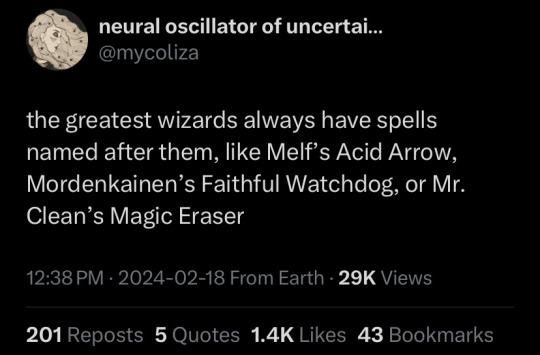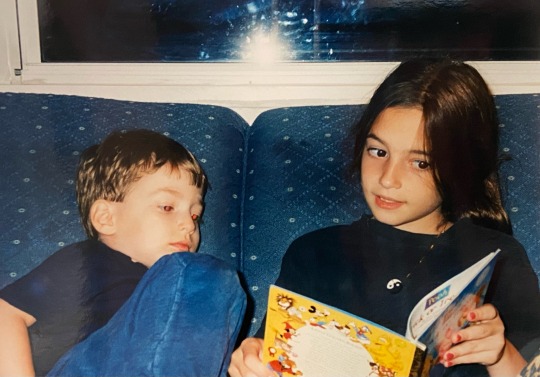Text
Delmore Schwartz
by Stanley Moss, 1967
He heard God coughing in the next apartment,
his life a hospital, he moved from bed to bed
with us and Baudelaire, except he always had
Finnegans Wake tucked in his pajamas,
which must mean, sure as chance,
the human race is God’s phlegm. Penitent,
I say a prayer in God’s throat:
“Mister, whose larynx we congest,
spit us into the Atlantic or Hudson…
let us be dropped into the mouth of the first fish
that survived by eating its young—
drink hot tea and honey Your mother brings You
till You are rid of Your catarrh, well again.
Let us swim back to our handiwork.”
Far from the world of Howth Castle, Delmore died
in a bed-bugged hotel, unclaimed for three days.
A week before, by chance, I saw him
at a drugstore counter, doubled over a coffee,
he moaned, “Faithful are the wounds of a friend,
deceitful enemy kisses.”
He held my hand too tight, too long.
Melancholy Eros flew to my shoulder,
spoke in Greek, Yiddish, and English:
“Wear his sandals, his dirty underwear,
his coat of many colors that did not keep him warm.”
6 notes
·
View notes
Text
I sneezed and burst a blood vessel in doing so and sprayed blood all over my reMarkable while continuing to annotate Heat 2 Delmore Schwartz-style. I'm taking deconstruction to a new level here. Il n'y pas hors-texte, though you might find yourself unexpectedly smeared right on it.
15 notes
·
View notes
Text
“You know I have this, uh, recurring dream. I'm sitting at this big banquet table and all of the victims of all the murders I've ever worked are sitting at this table, and they're staring at me with these black eyeballs... ‘cause they got eight ball hemorrhages from the head wounds. And there they are, these big balloon people, because I found them two weeks after they’d been under the bed. The neighbors reported the smell. And there they are, all of them, just sitting there.”
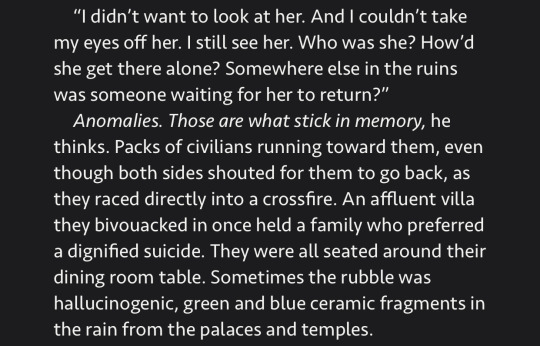


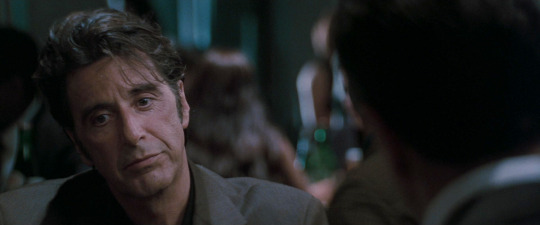

The order of the ritual is paramount in importance because it lends a sense of continuity to a culture. A ritual is both able to regulate society's order through its own order, as well as serve as a means of reestablishing that order when the normative patterns of a society have collapsed. This is part of the reason the "correct" method of enacting a ritual is so important and why a set of behaviors meant to unify a community can often lead to its dissolution or fragmenting. In addition to regulating a society’s order, ritual can be used to define a spatial area. In this way a ritual should be conceived of as “first and foremost, a mode of paying attention.” [...] Thus, if the ritual can be said to have a message, it “is less an idea to be taught and more a reality to be repeatedly experienced.” [...]
Offerings to gods are usually ritual offerings, able to take the role of any of the three basic types of ritual, and must be proffered in a precise way in order for them to be acceptable. [...] There is no denying that by far the most important form of offering was that of animal sacrifice. For “as sacrifice was the raison d’etre of the archaic temple…a temple or altar without sacrifice is a mere monument.” [...] Two major forms of sacrifice can be readily identified, that of gift and that of substitute. [B]oth are marked by the idea that they will either reify the existing world or reinstate a broken or completely destroyed reality (in the line of restoration or maintenance rituals). Ritual offerings are a means of reconciliation with the gods.
—Amy M. Fisher, "Pour Forth the Sparkling Chalice: An Examination of Libation Practices in the Levant," 2007

The Shulchan Arukh (“Set Table”) is the most widely accepted code of Jewish law ever written. Compiled in the 16th century by Rabbi Yosef Karo, it is a condensed and simplified version of the Beit Yosef, a commentary that Karo wrote on the Tur.
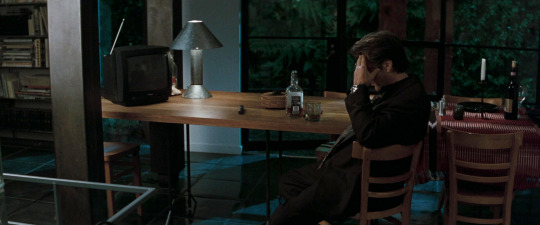
The vessels appear in the list of items to be constructed for the table within the Tabernacle. Setting a table for the gods with the foods of kings was a common ritual in both Mesopotamia and Egypt. A set table was “a mark of affluence and status.” The importance of a set table for God is confirmed by the need for one not only in the Tabernacle, but also in both Solomon's temple and Ezekiel's plans for a temple. This need did not end with the exile, as First Maccabees attests to a table in the post-exilic temple, and the Arch of Titus clearly depicts a table with a goblet perched upon it being carted off with the other spoils from the temple. Unlike the set tables of other religions, this one lacked a feast. It only held empty vessels[...] (Fisher, 2007.)
3 notes
·
View notes
Text
Herein lies a contradiction typical of extreme mainstream culture in film, which cannot but be ambitious (the amount of money invested in it requires it) but has to contain (in both senses of “checking” and “enclosing”) the potential it is forced to make use of. In Red Dragon this happens by means of the utterly impoverishing psychological proto-narrative involving the main evil character, a boy, we are shown, who was raised by a domineering grandmother and whose memories still haunt him. But if this subtext fails to completely mediate an abused childhood with the posthuman Red Dragon, it serves the purpose of inserting the family space as both the origin of the problem and the realm of its possible solution. Reba McClane, a blind woman who works with Dolarhyde, is not shocked by his looks and eccentric behavior; she represents an equal, someone who also has a “disability” but who manages to function well in society. She is a source of hope inasmuch as with her the Red Dragon’s evil could be tamed by the formation of a nuclear family. If only Dolarhyde had not misrepresented the relationship between Reba and Ralph Mandy, another coworker, so the film makes us wonder, then there would be a way out for him, a passage from the dark and dangerous world of writing/reading to that of the lack of ambiguity in the conflict-free home.
Mediating between the hero and villain is the third pivotal element of the film: the police and the FBI. It is Crawford himself who takes Graham away from what we are led to see as paradise, and it is the FBI and the police who provide the material support needed for him to read and reconstitute what passes through Dolarhyde’s mind. What they obviously represent is a social apparatus of repression, one which, again, evinces the most astounding development from the stone-age computers in Manhunter to the up-to-date digitalized network of identification and decoding. It would be tempting to posit an en abîme structure in this case, whereby the technological development undergone by the police would be a miniature of, and would stand for, the film itself in relation to its precursor. But whether or not one relies on this clue, the parallels between the police and mainstream film are worth paying attention to, for both are socially prominent and aspire to be ubiquitous. (The camera indeed has come to perform both roles of universal instrument of surveillance and fundamental means of representation, as the verb “to shoot” and its derivatives attest.)
Furthermore, there is something revealing in the kind of opulence at stake here, not only in the habitually exorbitant Hollywood film budget (by now an important part of any mainstream film advertisement campaign) but also in the amount of resources available to repressive apparatuses. Perhaps one has to live in a Third World country, as I do, to be able to recuperate something of the amazement coming from the disproportionality between that one individual, Dolarhyde, and the State’s inextinguishable resources. From the point of view of its employees (state policemen, FBI agents, all sorts of technicians), an interesting dialectics takes place, whereby the agents of repression renounce the division between their private lives and their work in order to guarantee that this division remain absolute. As for material resources, their total deployment of means is redolent of the purest totalitarian fantasy: in a film where realism seems only to be left aside in the murderer’s pathological, delirious transgression, one might very well ask if this apparently infinite availability—of helicopters, 24-hour personnel, computers, and so forth—is not somehow fanciful, even in the case of a famous serial killer deserving abundant news coverage. The suspicion may very well arise, that is, that in this perfect working of the repressive machine (no one on vacation here, no single computer breakdown, no one using any equipment when it is not needed, no space for a lazy “let’s-do-it-tomorrow” attitude) a social truth is manifested: that writing/reading is dangerous and that to combat it there are no limits to the State apparatuses of counter-reading.
—Fabio Akcelrud Durão, "A Short Circuit of Reading: Red Dragon as Anti-Theory," 2004. Emphasis mine.
#fabio akcelrud durão#red dragon#thomas harris#manhunter 1986#red dragon 2002#literary theory#heat 2 midrash
5 notes
·
View notes
Text

“For me the sun rises and sets with her, man.”
4 notes
·
View notes
Text
Ranking Pesach subsistence items available at my parents’ house
Matzah: 2/10, really aptly named "the bread of affliction," resorting to it amounts to punishment for my own laziness
Matzah with crunchy peanut butter: Ugh. Fine. 3/10
Matzah with a sinus-obliterating quantity of the Gold's extra spicy horseradish: 3.5/10
Macaroons: 6/10, far from superlative as cookies go but very difficult to eat a normal amount of these
Those fucking chocolate covered jelly rings: 0/10 I took a bite of one to see if they were as vile as I remembered them and recoiled in disgust
Steaks with baked potato and frozen peas because my dad said “fuck it” and fired up the grill: 8/10 definitely the meal to beat
26 notes
·
View notes
Text
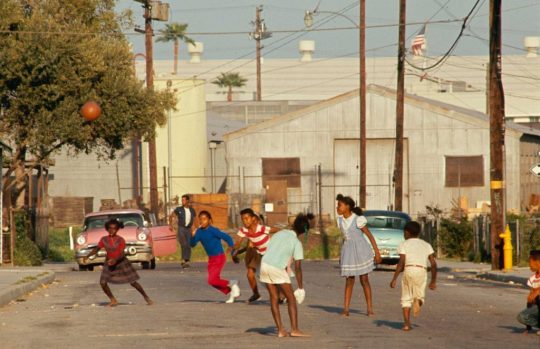



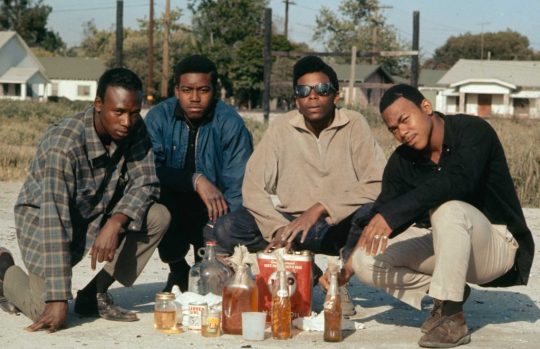
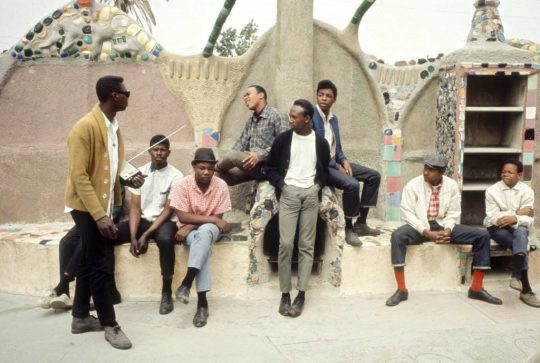
some of my favorite photos by Bill Ray for LIFE Magazine
Watts neighborhood of Los Angeles in 1966
168 notes
·
View notes
Text


if anyone new here is concerned about this whole thing being a scam, the first pic is me and my SDit as a puppy last spring, the second pic is me a couple days ago with megace, a cancer drug that increases appetite to treat cachexia in very sick people. just one of several new specialty medications i take now, lol. the second pic has been edited to redact my personal information. the difference in how i look is substantial, at least to me. for anyone who needs more info in private, i can provide evidence of medical tests, care, meds, bills, whatever; can provide evidence of all that other shit with my car, family, service dog in training, etc too. i'm not okay, lol, and i'm not keen on dying before i even get to see the specialized oncologist. just the newest of many very cool tricks gd loves to play on eden 👍
venmo: enimi / cashapp: $stoat / paypal.me/stoat / i also have Wise as an option for international transfers
1K notes
·
View notes
Text
everyone has a phrase that immediately sends them into a depressive spiral no matter how good they were feeling beforehand, like a dark incantation. mine is "untitled jurassic world movie (2025) directed by gareth edwards"
24 notes
·
View notes
Text
It is impossible to translate from any language and convey the exact meaning of every word. There’s a funny story about an ad for Coca-Cola in China. The translator rendered the slogan “Coke adds life,” as “Coke brings your ancestors back from the dead.” Understandably, this was unsettling to a number of Chinese. The ad was pulled off the air immediately.
12 notes
·
View notes
Text

My mom handed me this photo from what must be 2000 or 2001. I am really living the dream here (eating corn chip, reading Gundam Wing manga).
46 notes
·
View notes
Text


visual by zayn alarbi, words by ibrahim nasrallah
10K notes
·
View notes
Text
youtube
My "Where did he get it?!" moment, only with electronic music instead of jazz.
7 notes
·
View notes
Text
Omg. You have to turn it up but his little squeaky snores…
25 notes
·
View notes
